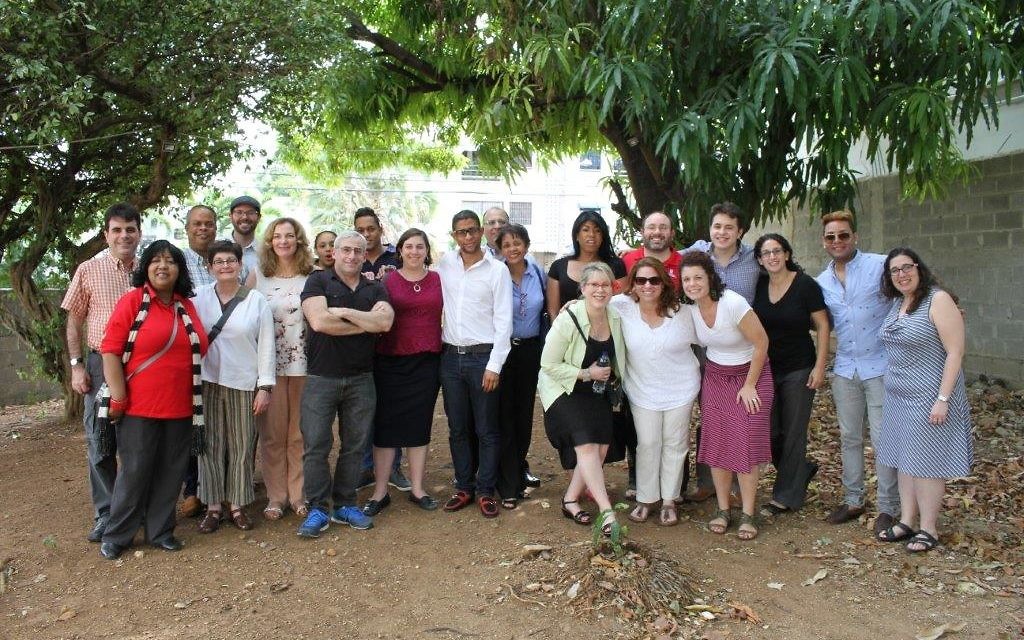Dominican Mission Reflects Bet Haverim’s Advocacy
Congregation Bet Haverim’s longtime rabbi, Joshua Lesser, typified the Reconstructionist congregation’s tradition of activism and advocacy by joining nine other rabbis on a weeklong American Jewish World Service mission trip to the Dominican Republic in January.

“So many of our texts, so much of our tradition and really where my rabbinate has always been is also, alongside our own particularistic questions, we’ve always had these issues of what’s our role in the world,” Rabbi Lesser said. “What part do we want to play? How do we want to be part of the solution?”
The Dominican trip focused on the problem of hundreds of thousands of Dominicans who have been stripped of or denied citizenship because of their Haitian ancestry, even though most of them have lived on the Dominican side of the Caribbean island for generations and speak Spanish, not Creole, and even though few Dominicans lack any Haitian blood.
Get The AJT Newsletter by email and never miss our top stories Free Sign Up
It’s an issue that smacks of racism in a nation with a history of valuing light skin color, to the extent that when the Dominican Republic agreed to take in Jewish refugees from Europe in 1938, the motivation, aside from a payment of $2 million, was to bring in more white people. The denial of basic rights based on race and ethnicity hit close to home for Rabbi Lesser as a native Atlantan, a Jew and an American (the United States had a role in encouraging the use of Haitian labor in the Dominican sugarcane fields).
Such connective threads, Rabbi Lesser said, enable him to try to follow the “fourfold song” teaching of Rabbi Abraham Isaac Kook and weave together the songs of self, Israel, humanity and the cosmos.
“I actually don’t think that in the 21st century we have the luxury to say we’re going to focus on only one thing,” Rabbi Lesser said.
The mission provided training in the human rights model AJWS applies in the 19 foreign nations in which it operates and fit Rabbi Lesser’s interest in combining spiritual-pastoral work with advocacy and activism. The rabbis met with two nongovernmental organizations a day. The NGOs’ focus ranged from statelessness and women’s health to LGBTQ issues and the problems of trans sex workers.
Along the way, they heard heart-rending stories, such as a baseball player who is on the edge of fulfilling his dream of playing professional baseball but can’t sign a contract without documentation of his Dominican citizenship. Another man has all the proper documentation to get his national identity card, but government officials have given him the bureaucratic runaround for more than two years, forcing him to take off-the-books construction work for which he too often fails to get paid.
The rabbis focused on those kinds of stories — of people who have the documentation that should make the process easy but still are denied identity cards — when they met with U.S. Embassy officials.
Rabbi Lesser is determined to share the stories within Bet Haverim and continue his Dominican advocacy, as he did with a trip to Washington in March.
“For a congregation like mine, where I have so many CDC workers who are involved in different parts of the world, for instance, and tell their stories, it puts us in a context of making a difference,” he said. “We’re a medium-size congregation, but we’re able to have a significant impact, particularly because we’re doing work where the Jewish community is not yet doing work, whether that’s locally and now hopefully internationally in this way.”
The most spiritual moment of the mission emphasized for Rabbi Lesser that helping the Dominicans is a core expression of Judaism.
The trip happened to include Shabbat Shirah, when we read about the crossing of the Sea of Reeds and the celebration led by Miriam with her tambourine. The last meeting heading into Shabbat on Jan. 22 was with the Board of the Women of Mama Tingo, a women’s rights organization, whose members closed the session by singing liberation and freedom songs accompanied by timbrels and tambourines.
Rabbi Lesser said he told his fellow rabbis that Shabbat Shirah was happening right in front of them. “In that moment I really got that this is the story of us.”





comments